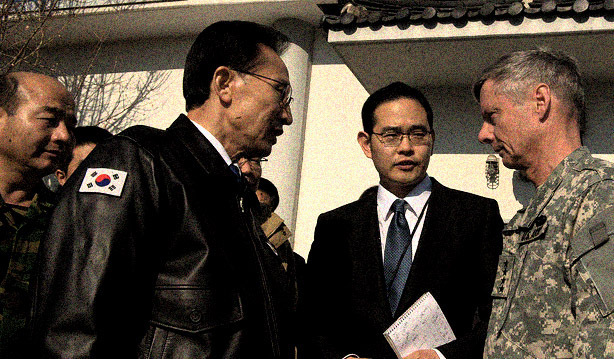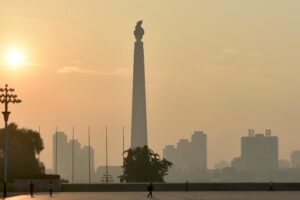In 1988 the political scientist Robert Putnam introduced the idea of a ‘two-level game’. In this game, Putnam noted that successful international negotiations can only be reached if a balance is struck between the interests of the domestic and international actors involved. At the domestic level, actors, such as politicians or the electorate, exert pressure on their government to adopt a foreign policy that fits their interests, whilst at the international level, actors – in this case other sovereign states –also look to influence other governments’ agendas. In this diplomatic game, governments bargain, uphold and concede aspects of their foreign policy, with a ‘win-set’ occurring when a balance is struck between the interests of all parties involved. For Lee Myung-bak’s game, the two levels do not, unfortunately, align particularly helpfully with his own interests. Domestically, Lee is faced with competing pressures from the electorate and fellow politicians, whilst internationally he faces the demands of the U.S. alliance and the increasingly forceful moves of both China and Russia on the peninsula. Potential changes in the state of play prompted by movements in the leaderships of the U.S., Russia and China could mean that a continued inflexibility in the South’s DPRK policy could damage its position in future negotiations, indicating that Seoul’s playbook is likely to come under increasing pressure both domestically and internationally.
The domestic politics of the Korean peninsula could easily be overlooked by the casual observer in favour of recent headline-grabbing incidents such as the DPRK’s nuclear and missile tests or joint U.S-ROK military exercises. However, the effects of public opinion, media coverage, and allegations of corruption cannot be lightly dismissed, as from American Idol to the White House, the consequences of being voted out by the public remain the same. In this vein, speculating about the emerging issues surrounding the domestic politics of South Korea may allow one to hypothesise about potential changes in play on the peninsula.
In 1988 the political scientist Robert Putnam introduced the idea of a ‘two-level game’. In this game, Putnam noted that successful international negotiations can only be reached if a balance is struck between the interests of the domestic and international actors involved. At the domestic level, actors, such as politicians or the electorate, exert pressure on their government to adopt a foreign policy that fits their interests, whilst at the international level, actors – in this case other sovereign states –also look to influence other governments’ agendas. In this diplomatic game, governments bargain, uphold and concede aspects of their foreign policy, with a ‘win-set’ occurring when a balance is struck between the interests of all parties involved. For Lee Myung-bak’s game, the two levels do not, unfortunately, align particularly helpfully with his own interests. Domestically, Lee is faced with competing pressures from the electorate and fellow politicians, whilst internationally he faces the demands of the U.S. alliance and the increasingly forceful moves of both China and Russia on the peninsula. Potential changes in the state of play prompted by movements in the leaderships of the U.S., Russia and China could mean that a continued inflexibility in the South’s DPRK policy could damage its position in future negotiations, indicating that Seoul’s playbook is likely to come under increasing pressure both domestically and internationally.
The domestic politics of the Korean peninsula could easily be overlooked by the casual observer in favour of recent headline-grabbing incidents such as the DPRK’s nuclear and missile tests or joint U.S-ROK military exercises. However, the effects of public opinion, media coverage, and allegations of corruption cannot be lightly dismissed, as from American Idol to the White House, the consequences of being voted out by the public remain the same. In this vein, speculating about the emerging issues surrounding the domestic politics of South Korea may allow one to hypothesise about potential changes in play on the peninsula.
Become a member for less than $4 per week.
Unlimited access to all of NK News: reporting, investigations, analysis
The NK News Daily Update, an email newsletter to keep you in the loop
Searchable archive of all content, photo galleries, special columns
Contact NK News reporters with tips or requests for reporting
Get unlimited access to all NK News content, including original reporting, investigations, and analyses by our team of DPRK experts.
Subscribe now
All major cards accepted. No commitments – you can cancel any time.










